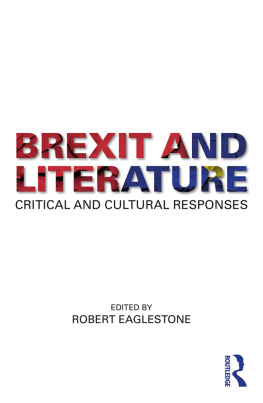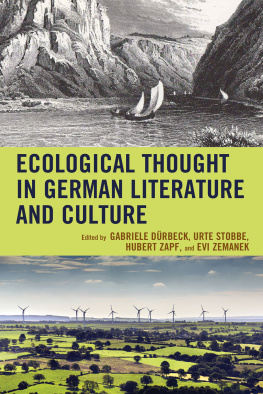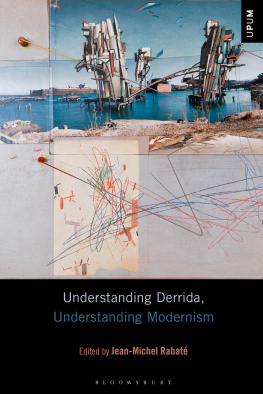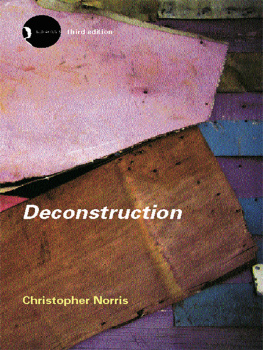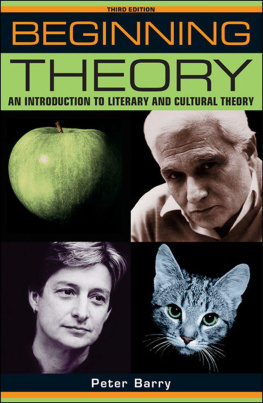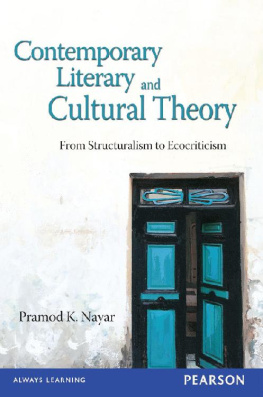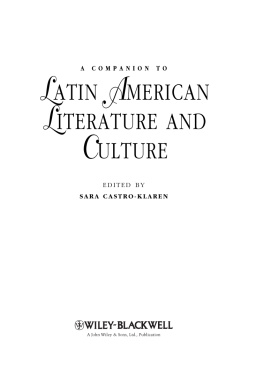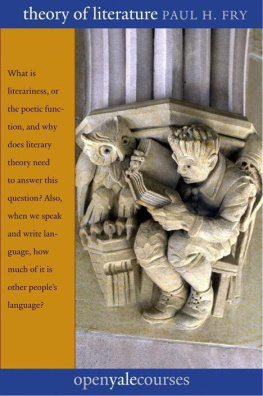Challenging Theory:
Discipline after Deconstruction
For Douglas
Challenging Theory:
Discipline After Deconstruction
Catherine Burgass
Studies in European Cultural Transition
Volume One
General Editors: Martin Stannard and Greg Walker
First published 1999 by Ashgate Publishing
Reissued 2018 by Routledge
2 Park Square, Milton Park, Abingdon, Oxon, 0X14 4RN
711 Third Avenue, New York, NY 10017, USA
Routledge is an imprint of the Taylor & Francis Group, an informa business
Copyright Catherine Burgass, 1999
The author has asserted her right under the Copyright, Designs and Patents Act, 1988, to be identified as the author of this work
All rights reserved. No part of this book may be reprinted or reproduced or utilised in any form or by any electronic, mechanical, or other means, now known or hereafter invented, including photocopying and recording, or in any information storage or retrieval system, without permission in writing from the publishers.
Notice:
Product or corporate names may be trademarks or registered trademarks, and are used only for identification and explanation without intent to infringe.
Publishers Note
The publisher has gone to great lengths to ensure the quality of this reprint but points out that some imperfections in the original copies may be apparent.
Disclaimer
The publisher has made every effort to trace copyright holders and welcomes correspondence from those they have been unable to contact.
A Library of Congress record exists under LC control number: 99066608
Typeset by Pat FitzGerald
ISBN 13: 978-1-138-62576-1 (hbk)
ISBN 13: 978-1-138-62584-6 (pbk)
ISBN 13: 978-0-429-45966-5 (ebk)
Contents
This book was initially a PhD thesis and I am very grateful both for funding from the British Academy and for the help of my supervisors, Clare Hanson and Phil Shaw. I am also grateful to Martin Stannard for his encouragement. Peter Brooker read and constructively disagreed with an earlier version of Chapter 4. Earlier versions of Chapter 2 have appeared in Euresis: Cahiers Roumains dEtudes Litteraires, 12 (1996) and Romanian Review, 3512 (1998). I especially want to thank my parents, John and Christine Burgass, for their unstinting support.
General Editors Preface
The European dimension of research in the humanities has come into sharp focus over recent years, producing scholarship which ranges across disciplines and national boundaries. Until now there has been no major channel for such work. This series aims to provide one, and to unite the fields of cultural studies and traditional scholarship. It will publish the most exciting new writing in areas such as European history and literature, art history, archaeology, language and translation studies, political, cultural and gay studies, music, psychology, sociology and philosophy. The emphasis will be explicitly European and interdisciplinary, concentrating attention on the relativity of cultural perspectives, with a particular interest in issues of cultural transition.
Martin Stannard
Greg Walker
University of Leicester
The first generation of poststructuralist theorists were enthusiasts with a missionary zeal. These French intellectuals of the late 1960s believed that a synthesis of linguistics, literary criticism, psychoanalysis, and ideological critique would help to foment political revolution. Of course it did not, but the word has been disseminated widely and in Britain and America poststructuralism has been recruited in the critique of humanism, Enlightenment rationality, bourgeois liberalism, English literature and the discipline which endorsed and was endorsed by these values. For some, poststructuralism provided a fillip for a discipline which for decades had subsisted on a diet of close reading supplemented by pedestrian old historicism. There has also been a strong negative reaction from disciplinary traditionalists, who rejected Continental theory out of hand and clung resolutely to a form of Leavisite criticism. There remains an anti-theory faction in many English departments today, but the old opposition between theorist and anti-theorist is breaking down. The assimilation of theory within literary studies is indicated by the fact that since the 1980s it has been the norm, even for older universities, to include literary theory on the degree course, often as a core element. For students of English literature, theory is now part of disciplinary convention and poststructuralism is no longer the iconoclastic discourse it once was but claims are still being made for its ethical and political relevance.
Although deconstruction ranges across disciplinary boundaries and has been transformed into a coherent method of literary criticism, it is primarily a metaphysical discourse. Derrida has repeatedly shown how conceptual oppositions, whether in the texts of philosophy, literature or politics, are not mutually exclusive but irredeemably contaminated by or reliant upon each other. After Saussure, this model is accessible and, on an abstract level, cogent. But what has happened after Derrida is that deconstruction is often cited as the theoretical underpinning of arguments for the incorporation of literary theory into critical practice, or literary studies within cultural studies, or the practice of reading philosophy as literature. This assumes an untenable transition from the ideal realm of metaphysics to the real world of social practice and represents an inappropriate conflation of different types of difference. This study is an attempt to redress some common misinterpretations of Derridas work relating to the status of metaphysical oppositions and to block the equation that is often made between these metaphysical structures and the differences which operate within social institutions not to reject deconstruction out of hand, then, but to point to its limitations in the face of disparate cultural differences.
From the moment deconstruction transgressed its national boundaries it encountered resistance from philosophers in the Anglo-American academy. European philosophy does have its own tradition of positivism and Derrida is even regarded by some Continental philosophers as a charlatan, but Anglo-American philosophy in the twentieth century has been associated primarily with the analytical tradition, which rejected metaphysical inquiry in favour of positivistic investigations into language, logic, and sense-perception. One of the most notorious encounters between the two traditions took place in 1977 in the form of a published debate between Derrida and John Searle over the issue of intentionality in J.L. Austins speech-act theory. This dialogue is remarkable for its antagonism overt on Searles part, explicitly denied by Derrida. Searle pulls no punches and opens by berating Derrida for what he sees as a misreading of Austin in Signature Event Context:
It would be a mistake, I think, to regard Derridas discussion of Austin as a confrontation between two prominent philosophical traditions. This is not so much because Derrida has failed to discuss the central theses in Austins theory of language, but rather because he has misunderstood and misstated Austins position and thus the confrontation never quite takes place.1


